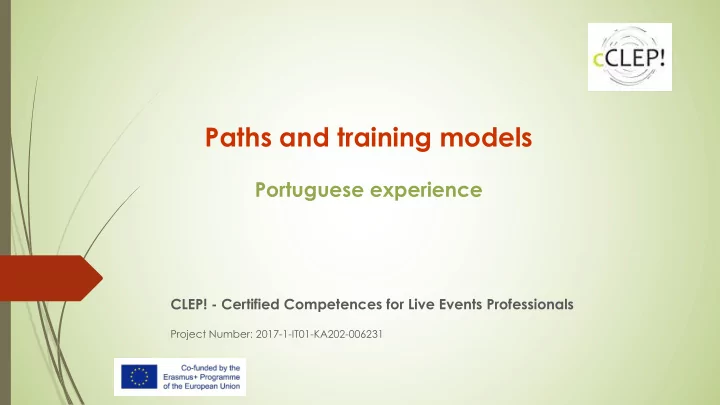

Paths and training models Portuguese experience CLEP! - Certified Competences for Live Events Professionals Project Number: 2017-1-IT01-KA202-006231
Epralima- Vocational Training School ´ Deolinda Silva ´ Position: Technician of Guidance, Recognition, Validation and Certification of Competencies at Epralima that is a Vocational and Training School (Youth and Adult education). ´ Epralima’s role in cClep Project: Contribution to the development of the Training Path for the three Professions (Rigger; Scaffolder, Production Manager)
What is an Adult Training Course? The Adult Training Courses (ATC) are an offer of education and training for adults who want to raise their qualifications. These courses are developed according to dual certification courses and, when appropriate, to the profile and life history of adults, only for school qualification.
Adult Training Course- Secondary Level For Whom? Adults who already hold the 3rd cycle of basic(9 th grade) education or secondary education who wish to obtain a double certification may, when appropriate, develop only the technological training component of the corresponding ATC (Adult Training Course)
Adult Training Course - Structure In Portugal, we have to follow a base structure and the National Qualifications Catalogue, created by the National Agency, that provides guidelines on how to build / create a certain course that follows the scheme that I present http://www.catalogo.anqep.gov.pt / below. This base serves for the Training courses and for the process of certification of competencies .
Curricular structure of Adult Education and Training Courses – Secondary Level Training Components Total Formative Access Hours Basic Technological Practical training in Reflective Portfolio Pathway Conditions training (b) training (b) the work context (c) of Learning (d) S3 - Type A 9 th grade 550 h 1200 h 210 h 85 h 2045 S3 – Type B 10 th grade 200 h 1200h 210 h 70 h 1680 S3 – Type C 11 th grade 100 h 1200h 210 h 65 h 1575
Training Components ´ a)Basic Training : The minimum duration of basic training is 100 hours; ü Citizenship and Professionalism; ü Society, Technology and Science; ü Culture, Language, Communication
Training Components ´ b)Technological Training: This includes several Modules selected from the Professional Catalogue( 25 or 50 hours each) in a total of 1200 hours. ´ c) Practical Training in work context: This part includes 210 hours and may also include between 50 and 100 hours corresponding to the foreign language.
Training Components ´ d) Reflective Portfolio of Learning: The number of hours can’t be less than 100; https://beverlyross.wordpress.com
Example What needs to be taken into consideration? For Whom? ´ Access Level ´ Level of Certification ´ Objectives ´ Career Opportunities ´ Modules Duration Basic Training Citizenship and Professionalism 150h Society, Technology and Science; 150h Culture, Language, Communication 150h Technological Training Several Modules selected from the 1200h professional catalogue (25 or 50 hours each) in a total of 1200 hours Practical Training in work context 210h Reflective Portfolio of Learning Development of “ Life Story” 85h
Thank you for your attention Deolinda Silva
Recommend
More recommend